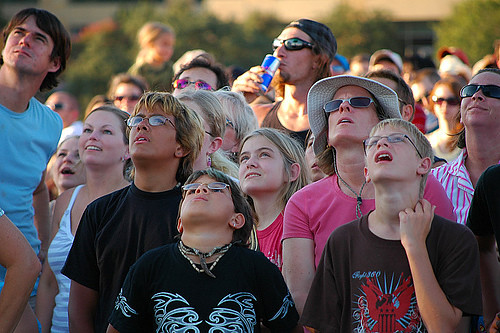This is the first time I’ve ever done this, but I’d like to welcome a guest writer to Betchablog. This post was written by one of my work colleagues, Pam Nutt, and was actually the first part of her welcoming address to staff for the start of the 2010 school year. I enjoyed hearing Pam deliver this address to our teachers so I asked if she’d mind posting it here for all to read. As you’ll discover, it was based on some of her experiences in Alice Springs in outback Australia, and I liked the way she linked it back to kids and learning. Enjoy!
—
 “You’re so privileged,” some said. “Very few people see the Todd flowing.” Others, with an almost reverential whisper, said “Only 1% of tourists see water flowing from Uluru.”
“You’re so privileged,” some said. “Very few people see the Todd flowing.” Others, with an almost reverential whisper, said “Only 1% of tourists see water flowing from Uluru.”
The sign outside the Alice Springs Desert Park said it all: “You will never look at deserts in the same way again.” Indeed. Torrential rain. Enormous umbrellas that benefited little. Puddles that we gave up walking around and just walked through. Pathways that resembled miniature Venetian canals.
I have to admit to a few churlish thoughts early on in that four and a half days of rain in the Red Centre. We were, after all, travelling with overseas friends, and the whole experience was meant to be postcard perfect – living, breathtaking Ken Duncan panoramas. And what was one of my first purchases in Alice Springs? An umbrella!
But it’s the surprise of it all that stays in my memory. The Todd not only flowing but breaking its banks in a spectacular display; the sound of it as well as the sight; the excitement of tourists and locals alike as we were all drawn down to the dry riverbed that had turned into an ever-expanding rush of noisy fast-flowing water.
And so the saga continued, with moment after moment taking us by surprise. Did it ever occur to you that you could be drowned in the torrent flowing down Kata Tjuta? That the road could be washed away in huge sections, barring your way to the MacDonnells? And to top it off, that Uluru should be shrouded in a mist that, rather than limiting our vision, enhances the mystery of the place.
Our final day at Uluru began with the obligatory dawn viewing – misty clouds on the top; subtly changing pastels beneath; the dawn of a beautifully sunny day and the sight of waterfalls glistening on the Rock. It wasn’t at all what I’d expected but it’s that sense of surprise, even awe, that remains with me. It’s a powerful and living landscape, not merely a postcard, and the fact that it was a shared experience enriched it further. Long live the experience of the unexpected.
It’s the unexpected that brings our experiences into sharp and memorable focus. I don’t wish to diminish events of unexpected horror and tragedy by not centering my thoughts on such moments. Rather, I’d like to reflect on the fact that out of our ordinary experiences come moments that can transform – the extraordinary behind the ordinary, as Patrick White observed. The power of the unexpected experience gives fresh meaning to the ordinary details of our lives.
Think of our classrooms. The fact that we have detailed programmes, desired outcomes and well-planned strategies clearly outlines what we expect in them. And these expectations are in no way to be derided, nor is the satisfaction that, at the end of it all, we’ve accomplished set goals. But I don’t ever recall being joyously excited by this. Satisfied. Happy. Gratified. Even relieved, perhaps. But what gives greatest cause for excitement are the unexpected moments that highlight the experiences of individual students. They’re often unexpected because they operate outside the formality of our written curriculum.
There’s the ‘A-ha!’ moment when a struggling student has suddenly grasped an elusive concept in terms that mean something to her. It could be a moment we easily miss – the rest of the class has got it quite some time earlier and moved on. But suddenly, there’s a “This poem really says what it feels to…” or “Macbeth could be a today story!” or ‘There’s a pattern here that I can finally understand and apply. It makes sense!” Then you know that a student has reached out and grabbed an idea for herself, rather than noted what you’ve said in order to give it back to you in an assessment task, intelligibly or otherwise.
There’s the moment when a clever, ambitious and articulate student quietly reaches out to spend time with someone who just doesn’t get it , taking joy from the shared experience of learning and celebrating what could seem to her to be a lesser achievement. There are the moments when students are prepared to laugh and talk with you, not just merely take down notes about what you are saying, or ask what they could have done to get 20/20 instead of 19/20. Or when a student from years ago meets you and says, “I remember in one of our classes…“ and they go on to tell you of something that they built into their life because of some interaction in a classroom.
There are the times when a group learns how to deal with accepting that not everyone is like them but is to be valued. Or the times when they understand why they are privileged, even though they’re not given everything they want. It’s a joy to see someone who rarely dips below an A sharing the moment with a student who’s excited about getting a C+. In the rush and pressure of teaching, it’s easy to miss those moments. It’s a joy when we experience the unexpected and it brings us back to the things that really count – what kind of people we are, what we value, where our hopes lie.
At all levels in our lives, experiencing the unexpected can have a profound impact. Valuing the unexpected in our classrooms, for example, goes far beyond expecting certain outcomes in relation to some learning stage. And such an experience of the unexpected, whether it be part of an intellectual, emotional or spiritual journey, may well have begun somewhere in a classroom, both for the pupil and the teacher.
I’ll never look at these unexpected experiences in the same way again.
Words and Video by Pam Nutt
CC BY-NC-ND Image by http://www.flickr.com/photos/skemsley/204933908


 I wrote a blog post a little while back called
I wrote a blog post a little while back called 
 Earlier this year, I had a visitor from South Africa contact me to ask if they could drop into the school at which I work while they were visiting Australia. She was were here as part of a study tour, and had heard some good things about PLC Sydney. In fact, her school in Johannesburg was a similar sort of school – independent, all girls, similar size – and she was interested in comparing a few ideas. Her school was also using IWBs extensively, and was keen to see how our staff were using them.
Earlier this year, I had a visitor from South Africa contact me to ask if they could drop into the school at which I work while they were visiting Australia. She was were here as part of a study tour, and had heard some good things about PLC Sydney. In fact, her school in Johannesburg was a similar sort of school – independent, all girls, similar size – and she was interested in comparing a few ideas. Her school was also using IWBs extensively, and was keen to see how our staff were using them.